State capital and independent city in Nevada, United States
| Carson City, Nevada | |
|---|---|
| State capital and independent city | |
| Consolidated Municipality of Carson City | |
 Downtown Carson City Downtown Carson City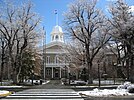 Nevada State Capitol Nevada State Capitol Carson City Mint Carson City Mint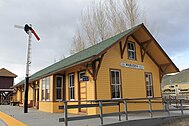 Nevada State Railroad Museum Nevada State Railroad Museum Stewart Indian School Stewart Indian School | |
 Flag Flag Seal Seal | |
| Nicknames: Carson, CC, The Capitol | |
| Motto: Proud of its Past...Confident of its Future | |
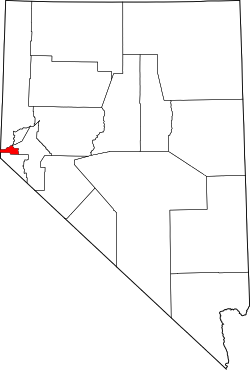 Location within Nevada Location within Nevada | |
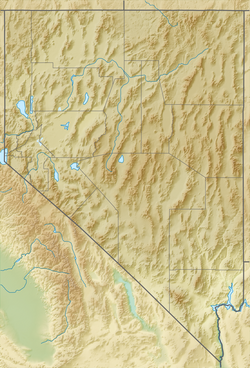  | |
| Coordinates: 39°9′52″N 119°46′1″W / 39.16444°N 119.76694°W / 39.16444; -119.76694 | |
| Country | United States |
| State | Nevada |
| Founded | 1858; 167 years ago (1858) |
| Named for | Kit Carson |
| Government | |
| • Mayor | Lori Bagwell |
| Area | |
| • Total | 157.12 sq mi (406.94 km) |
| • Land | 144.53 sq mi (374.34 km) |
| • Water | 12.59 sq mi (32.59 km) 8.0% |
| Elevation | 4,682 ft (1,427 m) |
| Population | |
| • Total | 58,639 |
| • Density | 405.71/sq mi (156.65/km) |
| Time zone | UTC−8 (Pacific) |
| • Summer (DST) | UTC−7 (Pacific) |
| ZIP code | 89701–89706, 89711–89714, 89721,89703 |
| Area code | 775 |
| GNIS feature ID | 863976 |
| Website | carson.org |
| Nevada Historical Marker | |
| Reference no. | 44 |
Carson City, officially the Consolidated Municipality of Carson City, is an independent city and the capital of the U.S. state of Nevada. As of the 2020 census, the population was 58,639, making it the 6th most populous city in the state. The majority of the city's population lives in Eagle Valley, on the eastern edge of the Carson Range, a branch of the Sierra Nevada, about 30 miles (50 km) south of Reno. The city is named after the mountain man Kit Carson (1809-1868). The town began as a stopover for California-bound immigrants, but developed into a city with the Comstock Lode, a silver strike in the mountains to the northeast. The city has served as Nevada's capital since statehood in 1864; for much of its history it was a hub for the Virginia and Truckee Railroad, although the tracks were removed in 1950.
Before 1969, Carson City was the county seat of Ormsby County. That year, after a referendum approved merging the city and the county, the state legislature issued a revised city charter that merged them into the Consolidated Municipality of Carson City. With the consolidation, the city limits extend west across the Sierra Nevada to the California-Nevada state line in the middle of Lake Tahoe. Like other independent cities in the United States, it is treated as a county-equivalent for census purposes.
History

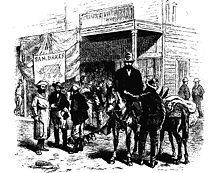
The Washoe people have inhabited the valley and surrounding areas for about 6,000 years.
The first European Americans to arrive in what is now known as Eagle Valley were John C. Frémont and his exploration party in January 1843. Fremont named the river flowing through the valley Carson River in honor of Kit Carson,(1809-1868), the mountain man, explorer and scout he had hired for his expedition. Later, settlers named the area Washoe, in reference to the indigenous people.
By 1851, the Eagle Station ranch along the Carson River was a trading post and stop-over for westbound travelers and wagons on the California Trail's Carson Branch, which ran through Eagle Valley. The valley and trading post received their name from a bald eagle that was hunted and killed by one of the early settlers and was featured pinned on a wall inside the post.
As the area was part of the larger Utah Territory (1850-1896), it was governed from the territorial (and later state) capital of Salt Lake City on the eastern shore of the Great Salt Lake, where the territorial government was headquartered there several hundred miles further east with Mormon (The Church of Jesus Christ of Latter-day Saints) patriarch of Brigham Young (1801-1877), as first Governor of Utah. Early settlers bristled at the control by Mormon-influenced officials and desired the creation of the provisional Nevada Territory with Isaac Roop (1822-1869, served 1859-1861), as provisional Governor. A vigilante group of influential settlers, headed by Abraham Curry (1815-1873), sought a site for a capital city for the envisioned future separate territory. In 1858, Abraham Curry bought Eagle Station and the settlement was thereafter renamed Carson City. Curry and several other partners had Eagle Valley surveyed for development. Curry decided Carson City would someday serve as the capital city and left a 10-acre (40,000 m) plot in the center of town for a capitol building.
After gold and silver ore were discovered in 1859 on the nearby newly-named Comstock Lode, Carson City's population began to grow. Curry built the Warm Springs Hotel a mile to the east of the town center. When new territorial governor James W. Nye (1815-1876, served 1861-1864), traveled east to Nevada, he chose Carson City as the territorial capital instead of earlier Genoa, which had functioned temporarily as such for the past few years. Influenced by Carson City lawyer William M. Stewart (1827-1909), who escorted him from the port of San Francisco, California where he arrived onboard a passenger steamboat liner, then journeying uphill past Sacramento to Nevada. As such, Carson City bested Virginia City and American Flat. Curry loaned the Warm Springs Hotel to the territorial Legislature as a temporary meeting hall. The Legislature named Carson City to be the county seat of Ormsby County and also selected the hotel as the territorial prison, with Curry serving as its first warden. Today, the property is still part of the state prison.
When Nevada became the 36th state in 1864 during the American Civil War (1861-1865), Carson City was confirmed as Nevada's permanent state capital. Carson City's development was no longer dependent on the mining industry and instead became a thriving commercial center. The Virginia and Truckee Railroad was built between Virginia City and Carson City. A log flume was also built from the Sierra Nevada mountains range into Carson City. The current Nevada State Capitol building was constructed from 1869 to 1871. The United States Mint also operated its branch of the Carson City Mint between the years of 1870 and 1893, which struck gold and silver coins of United States currency. People came from China during that time, many to work on the transcontinental railroad being constructed. Some of them owned businesses and taught school. By 1880, almost a thousand Chinese people, "one for every five Caucasians", lived in Carson City.
Carson City's population and transportation traffic decreased when the Central Pacific Railroad built a branch line through Donner Pass to connect with the Carson and Colorado Railroad. The new branch also bypassed the Virginia & Truckee line, and ran too far to the north to benefit Carson City. The city was slightly revitalized with the mining booms in nearby Tonopah and Goldfield. The United States federal building (now renamed the Paul Laxalt Building) was completed in 1890 as was the Stewart Indian School. Even these developments could not prevent its population from dropping to just over 1,500 people by 1930. Carson City resigned itself to small city status, advertising itself as "America's smallest capital". The city slowly grew after World War II (1939/1941-1945); by 1960, it had reached its former 1880 mining boom-town era population size of 80 years before.
20th-century revitalization and growth
As early as the late 1940s, discussions began about merging Ormsby County and Carson City. By this time, the county was little more than Carson City and a few hamlets to the west. By the 1960 census, all but 2,900 of the county's residents lived in Carson City. However, the effort did not pay off until 1966, when a statewide referendum approved the merger. The required constitutional amendment was passed in 1968. On April 1, 1969, Ormsby County and Carson City officially merged as the Consolidated Municipality of Carson City. With this consolidation, Carson City absorbed former town sites such as Empire City, which had grown up in the 1860s as a milling center along the Carson River and current U.S. Route 50. Carson City could now advertise itself as one of America's largest state capitals with its 146 square miles (380 km) of city limits.
In 1991, the city adopted a downtown master plan, specifying no building within 500 feet (150 metres) of the capitol would surpass it in height. This plan effectively prohibited future high-rise development in the center of downtown. The Ormsby House is the tallest building in downtown Carson City, at a height of 117 feet (36 m). The structure was completed in 1972.
Geography
Most of the city proper resides in the Eagle Valley. The Carson River flows from Douglas County through the southwestern edge of both the valley and Carson City. Since the consolidation, the city limits today include several small populated areas outside of this valley. Today the city limits include several peaks in the Sierra Nevada, small portions of both the Virginia Range and the Pine Nut Mountains and portions of Marlette Lake and Lake Tahoe. The highest elevation in city limits is Snow Valley Peak at an elevation of 9,214 feet (2,808 m). Carson City is one of two state capitals that border another state, the other being Trenton, New Jersey.
Climate
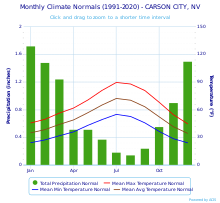
Carson City features a cold semi-arid climate (Köppen: BSk, Trewartha: BSak) with cold winters and hot summers. The city is in a high desert river valley approximately 4,802 feet (1,464 m) above sea level. There are four fairly distinct seasons. Winters see typically light to moderate snowfall, with an average of 14.0 inches (0.36 m), with the most snowfall being 82.1 inches (2.1 m) from July 1951 to June 1952 and the least 3.1 inches (0.079 m) from July 2002 to June 2003. Most precipitation occurs in winter and spring, with summer and fall being fairly dry, drier than neighboring California. The wettest “rain year” was from July 1937 to June 1938 with 19.36 inches (491.7 mm) and the driest from July 1971 to June 1972 with 3.48 inches (88.4 mm). The most precipitation in one month occurred in December 1955 when 10.39 inches or 263.9 millimetres fell and the most snowfall 34.5 inches or 0.88 metres in March 1952. The most precipitation in one day has been 3.12 inches or 79.2 millimetres on November 19 of 1950.
There are 39.5 afternoons of 90 °F (32.2 °C)+ highs annually, with 100 °F (37.8 °C)+ temperatures occurring 1.2 afternoons per year. The hottest month has been July 2021 with an average of 77.6 °F (25.3 °C), the hottest temperature 107 °F (41.7 °C) on July 19, 1931, and the highest minimum 75 °F (23.9 °C) on August 1, 2022.
There are 125 mornings with lows below freezing, but afternoon maxima top 50 °F or 10 °C on all but 52 days, and top freezing on all but five. Temperatures below 0 °F or −17.8 °C are very rare, occurring about twice per winter and frequently not occurring at all. The coldest temperature in Carson City has been −27 °F or −32.8 °C on January 21, 1937, the lowest maximum 5 °F or −15 °C on December 12, 1932, and December 22, 1990, and the coldest month January 1949 with a mean temperature of 12.6 °F (−10.8 °C), although January 1937 at 14.9 °F (−9.5 °C) is the only other month below 21 °F or −6.1 °C.
The average temperature in Carson City increased by 4.1 °F (2.3 °C) between 1984 and 2014, a greater change than in any other city in the United States.
| Climate data for Carson City, Nevada, 1991–2020 normals, extremes 1893–present | |||||||||||||
|---|---|---|---|---|---|---|---|---|---|---|---|---|---|
| Month | Jan | Feb | Mar | Apr | May | Jun | Jul | Aug | Sep | Oct | Nov | Dec | Year |
| Record high °F (°C) | 72 (22) |
76 (24) |
81 (27) |
88 (31) |
94 (34) |
101 (38) |
107 (42) |
105 (41) |
103 (39) |
93 (34) |
79 (26) |
75 (24) |
107 (42) |
| Mean maximum °F (°C) | 59.3 (15.2) |
62.4 (16.9) |
70.7 (21.5) |
77.9 (25.5) |
85.6 (29.8) |
93.6 (34.2) |
99.0 (37.2) |
96.5 (35.8) |
91.9 (33.3) |
82.7 (28.2) |
70.7 (21.5) |
60.5 (15.8) |
99.7 (37.6) |
| Mean daily maximum °F (°C) | 45.5 (7.5) |
49.5 (9.7) |
56.2 (13.4) |
61.7 (16.5) |
70.4 (21.3) |
80.9 (27.2) |
89.5 (31.9) |
87.8 (31.0) |
80.7 (27.1) |
68.0 (20.0) |
54.5 (12.5) |
44.6 (7.0) |
65.8 (18.8) |
| Daily mean °F (°C) | 34.8 (1.6) |
38.3 (3.5) |
43.9 (6.6) |
48.8 (9.3) |
56.6 (13.7) |
65.0 (18.3) |
72.1 (22.3) |
70.2 (21.2) |
63.1 (17.3) |
52.2 (11.2) |
41.4 (5.2) |
34.2 (1.2) |
51.7 (10.9) |
| Mean daily minimum °F (°C) | 24.1 (−4.4) |
27.1 (−2.7) |
31.6 (−0.2) |
35.8 (2.1) |
42.9 (6.1) |
49.2 (9.6) |
54.8 (12.7) |
52.5 (11.4) |
45.6 (7.6) |
36.3 (2.4) |
28.4 (−2.0) |
23.9 (−4.5) |
37.7 (3.2) |
| Mean minimum °F (°C) | 6.9 (−13.9) |
11.7 (−11.3) |
17.4 (−8.1) |
22.3 (−5.4) |
29.7 (−1.3) |
35.8 (2.1) |
44.4 (6.9) |
42.1 (5.6) |
34.3 (1.3) |
21.8 (−5.7) |
11.4 (−11.4) |
6.2 (−14.3) |
0.6 (−17.4) |
| Record low °F (°C) | −27 (−33) |
−22 (−30) |
−5 (−21) |
3 (−16) |
18 (−8) |
25 (−4) |
33 (1) |
26 (−3) |
17 (−8) |
6 (−14) |
−5 (−21) |
−26 (−32) |
−27 (−33) |
| Average precipitation inches (mm) | 1.72 (44) |
1.48 (38) |
1.24 (31) |
0.51 (13) |
0.51 (13) |
0.37 (9.4) |
0.18 (4.6) |
0.14 (3.6) |
0.24 (6.1) |
0.55 (14) |
0.90 (23) |
1.50 (38) |
9.34 (237) |
| Average snowfall inches (cm) | 3.6 (9.1) |
1.7 (4.3) |
1.6 (4.1) |
0.0 (0.0) |
0.0 (0.0) |
0.0 (0.0) |
0.0 (0.0) |
0.0 (0.0) |
0.0 (0.0) |
0.0 (0.0) |
0.7 (1.8) |
6.4 (16) |
14.0 (36) |
| Average precipitation days (≥ 0.01 in) | 6.2 | 5.6 | 4.8 | 3.2 | 3.4 | 1.7 | 0.9 | 1.0 | 1.1 | 2.4 | 3.3 | 4.8 | 38.4 |
| Average snowy days (≥ 0.1 in) | 1.8 | 1.4 | 1.0 | 0.1 | 0.0 | 0.0 | 0.0 | 0.0 | 0.0 | 0.0 | 0.6 | 1.4 | 6.3 |
| Source 1: NOAA | |||||||||||||
| Source 2: National Weather Service | |||||||||||||
Places of interest
See also: National Register of Historic Places listings in Carson City, NevadaMuseums
- Nevada State Capitol – original capitol still housing the governor's offices with museum exhibits
- Nevada State Museum – former branch of the United States Mint featuring rock, mining and prehistoric exhibits, and a recreated Wild West village
- Nevada State Railroad Museum – featuring the Inyo locomotive and relocated Wabuska Railroad Station
- Stewart Indian School – museum collection includes items from former faculty, students and school
- Foreman-Roberts House Museum – Gothic Revival architecture, tours available.
- Sears–Ferris House (not open to public) – home of George Washington Gale Ferris Jr., inventor of the Ferris wheel

- Yesterday's Flyers, an aviation museum in Carson City.
- Children's Museum of Northern Nevada – Carson City
Open land
- Silver Saddle Ranch
- Mexican Dam – 1860s stone dam across the Carson River
- Prison Hill – California Trail historic markers, location of the Stewart "S"
- Carson Aquatic Trail
- Humboldt-Toiyabe National Forest (Carson Ranger District)
- Kings Canyon Falls
- Snow Valley Peak – 9,214 ft (2,808 m) – highest point within Carson City
- Tahoe Rim Trail
- Lake Tahoe–Nevada State Park
- Lake Tahoe beachfront (several beaches along Lake Tahoe lie within the city limits)
- Chimney Beach
- Secret Harbor
- Whale Beach
- Skunk Harbor
- Washoe Lake State Park – borders city to the north
- "C Hill" – hill featuring the Carson City "C" and giant American Flag
Demographics
See also: Race and ethnicity in the United States CensusCarson City is the smallest of the United States' 366 metropolitan statistical areas.
| Census | Pop. | Note | %± |
|---|---|---|---|
| 1850 | 714 | — | |
| 1860 | 714 | 0.0% | |
| 1870 | 3,042 | 326.1% | |
| 1880 | 4,229 | 39.0% | |
| 1890 | 3,950 | −6.6% | |
| 1900 | 2,100 | −46.8% | |
| 1910 | 2,466 | 17.4% | |
| 1920 | 1,685 | −31.7% | |
| 1930 | 1,596 | −5.3% | |
| 1940 | 2,478 | 55.3% | |
| 1950 | 3,082 | 24.4% | |
| 1960 | 5,163 | 67.5% | |
| 1970 | 15,468 | 199.6% | |
| 1980 | 32,022 | 107.0% | |
| 1990 | 40,443 | 26.3% | |
| 2000 | 52,547 | 29.9% | |
| 2010 | 55,274 | 5.2% | |
| 2020 | 58,639 | 6.1% | |
| 2023 (est.) | 58,036 | −1.0% | |
| U.S. Decennial Census 1790–1960 1900–1990 1990–2000 | |||
As of the 2010 census, there were 55,274 people, 20,171 households, and 13,252 families residing in the city. The population density was 366 people per square mile (141 people/km). There were 21,283 housing units at an average density of 148 per square mile (57/km). The racial makeup of the city was 81.1% White, 1.9% Black or African American, 2.4% Native American, 2.1% Asian, 0.2% Pacific Islander, 9.4% from other races, and 2.9% from two or more races. 21% of the population were Hispanic or Latino of any race.
As of the 2000 census, there were 20,171 households, out of which 29.8% had children under the age of 18 living with them, 50.0% were married couples living together, 11.0% had a female householder with no husband present, and 34.3% were non-families. 27.8% of all households were made up of individuals, and 11.00% had someone living alone who was 65 years of age or older. The average household size was 2.44 and the average family size was 2.97. The city's age distribution was: 23.4% under the age of 18, 7.9% from 18 to 24, 28.9% from 25 to 44, 24.9% from 45 to 64, and 14.9% who were 65 years of age or older. The median age was 39 years. For every 100 females, there were 106.9 males. For every 100 females age 18 and over, there were 108.2 males.
Data from the 2000 census indicates the median income for a household in the city was $41,809, and the median income for a family was $49,570. Males had a median income of $35,296 versus $27,418 for females. The per capita income for the city was $20,943. 10.0% of the population and 6.9% of families were below the poverty line. Out of the total population, 13.7% of those under the age of 18 and 5.8% of those 65 and older were living below the poverty line.
Languages
As of 2010, 82.3% (42,697) of Carson City residents age 5 and older spoke English at home as a first language, while 14.1% (7,325) spoke Spanish, 0.6% (318) French, and numerous Indo-Aryan languages were spoken as a main language by 0.5% (261) of the population over the age of five. In total, 17.7% (9,174) of Carson City's population age 5 and older spoke a first language other than English.
Government and politics
See also: List of mayors of Carson City, NevadaOrmsby County consolidated with Carson City in 1969, and the county simultaneously dissolved. The city is now governed by a five-member board of supervisors, consisting of a mayor and four supervisors. All members are elected at-large, but each of the four supervisors must reside in respective wards, numbered 1 through 4. The mayor and supervisors serve four year terms. Elections are staggered so the mayor and the supervisors from Wards 2 and Ward 4 are elected in presidential election years, and the supervisors from Wards 1 and 3 are elected in the even-numbered years in between (i.e., the same year as gubernatorial elections).
The city is generally considered a Republican stronghold, often voting for Republicans by wide margins. In 2004, George W. Bush defeated John Kerry 57–40%. In 2008, however, Barack Obama became the first Democrat since 1964 to win Ormsby County/Carson City, defeating John McCain 49–48%, by 204 votes, a margin of under 1%.
| Year | Republican | Democratic | Third party(ies) | |||
|---|---|---|---|---|---|---|
| No. | % | No. | % | No. | % | |
| 2024 | 16,873 | 54.31% | 13,375 | 43.05% | 820 | 2.64% |
| 2020 | 16,113 | 54.18% | 12,735 | 42.82% | 891 | 3.00% |
| 2016 | 13,125 | 52.47% | 9,610 | 38.42% | 2,281 | 9.12% |
| 2012 | 12,394 | 53.15% | 10,291 | 44.13% | 634 | 2.72% |
| 2008 | 11,419 | 48.22% | 11,623 | 49.08% | 638 | 2.69% |
| 2004 | 13,171 | 57.00% | 9,441 | 40.86% | 494 | 2.14% |
| 2000 | 11,084 | 56.98% | 7,354 | 37.81% | 1,014 | 5.21% |
| 1996 | 9,168 | 48.73% | 7,269 | 38.64% | 2,377 | 12.63% |
| 1992 | 7,302 | 38.83% | 6,035 | 32.10% | 5,466 | 29.07% |
| 1988 | 9,701 | 63.44% | 5,088 | 33.27% | 502 | 3.28% |
| 1984 | 9,477 | 70.01% | 3,790 | 28.00% | 269 | 1.99% |
| 1980 | 8,389 | 66.81% | 2,769 | 22.05% | 1,398 | 11.13% |
| 1976 | 5,282 | 54.11% | 3,874 | 39.69% | 605 | 6.20% |
| 1972 | 5,396 | 71.79% | 2,120 | 28.21% | 0 | 0.00% |
| 1968 | 3,169 | 56.58% | 1,770 | 31.60% | 662 | 11.82% |
| 1964 | 1,997 | 48.40% | 2,129 | 51.60% | 0 | 0.00% |
| 1960 | 1,946 | 60.27% | 1,283 | 39.73% | 0 | 0.00% |
| 1956 | 1,749 | 68.03% | 822 | 31.97% | 0 | 0.00% |
| 1952 | 1,653 | 74.06% | 579 | 25.94% | 0 | 0.00% |
| 1948 | 1,095 | 60.80% | 681 | 37.81% | 25 | 1.39% |
| 1944 | 841 | 55.84% | 665 | 44.16% | 0 | 0.00% |
| 1940 | 748 | 48.79% | 785 | 51.21% | 0 | 0.00% |
| 1936 | 533 | 41.71% | 745 | 58.29% | 0 | 0.00% |
| 1932 | 486 | 45.63% | 579 | 54.37% | 0 | 0.00% |
| 1928 | 590 | 58.07% | 426 | 41.93% | 0 | 0.00% |
| 1924 | 413 | 44.31% | 415 | 44.53% | 104 | 11.16% |
| 1920 | 592 | 57.81% | 413 | 40.33% | 19 | 1.86% |
| 1916 | 534 | 43.52% | 610 | 49.71% | 83 | 6.76% |
| 1912 | 150 | 22.22% | 294 | 43.56% | 231 | 34.22% |
| 1908 | 350 | 46.60% | 343 | 45.67% | 58 | 7.72% |
| 1904 | 409 | 60.15% | 218 | 32.06% | 53 | 7.79% |
Carson City, being the state capital, has seen many political protests and demonstrations.
In an attempt to either make a proposed spent nuclear fuel storage facility at Yucca Mountain prohibitively expensive (by raising property tax rates to the maximum allowed) or to allow the state to collect the potential federal payments of property taxes on the facility, the state government in 1987 carved Yucca Mountain out of Nye County and created a new county with no residents out of the area surrounding Yucca called Bullfrog County. Carson City became the county seat of Bullfrog County, even though it was not in Bullfrog County and is more than 100 miles (160 km) from Yucca Mountain. A state judge found the process unconstitutional in 1989, and Bullfrog County's territory was retroceded to Nye County.
Culture
Sports and recreation
Carson City has never hosted any professional team sports. However, a variety of sports are offered at parks and recreation. Many neighborhood parks offer a wide variety of features including picnic tables, beaches, restrooms, fishing, softball, basketball hoops, ponds, tennis, and volleyball. The largest park is Mills Park, which has a total land area of 51 acres (0.21 km) and includes the 2 ft (610 mm) narrow-gauge Carson & Mills Park Railroad. While there are no ski slopes within Carson City, the city is near the Heavenly Mountain Resort, Diamond Peak and Mount Rose Ski Tahoe skiing areas.
Notable people
Carson City has served as one of the state's centers for politics and business. Every state governor since Denver S. Dickerson has resided in the Governor's Mansion in Carson City. The following personalities took up residence in Carson City at some point in their lives.
- Mackena Bell, racing driver
- Duane Leroy Bliss, timber businessman
- Orion Clemens, Secretary of Nevada Territory
- Steven S. Coughlin, American epidemiologist and author
- John Cradlebaugh, first Delegate to the U.S. House of Representatives from Nevada Territory
- Abraham Curry, founding father of Carson City and early politician
- Dat So La Lee, Native American basket weaver and artist
- Nellie Verrill Mighels Davis, journalist
- David Eddings, best selling author of fantasy novels
- George Washington Gale Ferris Jr., inventor of the Ferris wheel
- Ellen Hopkins, author
- Paul Laxalt, former Governor and U.S. Senator
- Greg LeMond, two time World Champion road racing cyclist, and three-time winner of the Tour de France
- Alice Little, Irish-American sex-worker and advocate
- David Lundquist, Major League baseball player (Chicago White Sox)
- Maurice E. McLoughlin, two-time U.S. Open champion, member of International Tennis Hall of Fame
- Henry Rust Mighels, journalist, politician, first husband of Nellie Verrill Mighels Davis
- Hank Monk, stagecoach driver
- William Ormsby, soldier and namesake of Ormsby County and Ormsby House
- Donovan Osborne, Major League baseball player (St. Louis Cardinals)
- Darrell Rasner, Major League baseball player (New York Yankees)
- Don Tatro, member of the Nevada Senate
- Mark Twain, author (lived with his brother Orion Clemens)
- Matt Williams, Major League third baseman (San Francisco Giants, Cleveland Indians, and Arizona Diamondbacks)
- Sarah Winnemucca, Native American activist and author
Economy and infrastructure
The following is a list of notable employers in Carson City from the fourth quarter of 2012:
1,000–1,499 employees
500–999 employees
200–499 employees
- Nevada Department of Corrections
- Nevada Department of Motor Vehicles
- Casino Fandango
- Walmart
- Precision Castparts Corp.
- Gold Dust West Hotel and Casino
- Carson Nugget
- Costco Wholesale Corporation
- Nevada Department of Conservation and Natural Resources
100–199 employees
- Nevada Department of Health and Human Services, Division of Welfare and Supportive Services
Transportation
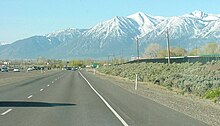
There are four highways in the city: Nevada State Route 28, U.S. Route 395, U.S. Route 50, and Interstate 580, its only freeway. Phase 1 of the Carson City Freeway Project from US 395, just north of the city, to US 50 was completed in February 2006, and Phase 2A, extending from Rt. 50 to Fairview Drive, was officially opened on September 24, 2009. Phase 2B, Fairview Drive to Rt. 50, was completed in August 2017. Prior to 2012, Carson City was one of only five state capitals not directly served by an interstate highway; the city lost this distinction when I-580 was extended into the city limits.
Carson City's first modern bus system, Jump Around Carson, or JAC, opened to the public in October 2005. JAC uses a smaller urban bus ideal for Carson City. Tahoe Transportation District connects Gardnerville with Carson City.
However, there is virtually no ground public transportation to other destinations. Passenger trains have not served Carson City since 1950, when the Virginia and Truckee Railroad was shut down. Greyhound Lines stopped their bus services to the town in 2006 and Amtrak discontinued their connecting thruway bus to Sacramento, California, in 2008. There is now only a limited Monday – Friday RTC bus service, to Reno which is still served by both Greyhound and Amtrak, as well as Eastern Sierra Transit Authority service from Lone Pine to Reno.
Carson City is also served by the Carson Airport, which is a regional airport in the northern part of the city. Reno–Tahoe International Airport, which is 28 miles (45 km) away, handles domestic commercial flights.
Education
The Carson City School District, the sole public school district of the city, operates ten schools there. The six elementary schools are Bordewich-Bray Elementary School, Empire Elementary School, Fremont Elementary School, Fritsch Elementary School, Mark Twain Elementary School, and Al Seeliger Elementary School. The two middle schools are Carson Middle School and Eagle Valley Middle School. Carson High School and the alternative Pioneer High School serve high school students. Carson High is on Saliman Road.
The district sponsors Carson Montessori School, a public charter school serving grades K-6. Students residing in any Nevada county may enroll. Carson Montessori School is the only school in district operating with a balanced budget. In 2019 Carson Montessori School received the Governor's STEM Schools Designation, an official recognition given to 25 schools statewide which causes a short ceremony attended by the governor during which receiving schools are assigned a 10-foot banner.
Western Nevada College (WNC) is a regionally accredited, two-year and four-year institution which is part of the Nevada System of Higher Education. The college offers many programs including education, arts and science.
Carson City has a public library, the Carson City Library.
Historic buildings
-
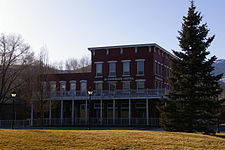 Historic St Charles Hotel in Carson City
Historic St Charles Hotel in Carson City
-
 Former Carson City Post Office
Former Carson City Post Office
-
The Governor's Mansion in Carson City
-
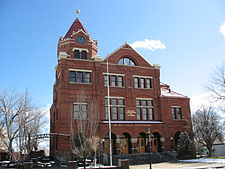 Paul Laxalt State Building – formerly the U.S. Court House & Post Office, now home to the Nevada Commission on Tourism
Paul Laxalt State Building – formerly the U.S. Court House & Post Office, now home to the Nevada Commission on Tourism
See also
References
- "ArcGIS REST Services Directory". United States Census Bureau. Retrieved September 19, 2022.
- ^ "Geographic Names Information System". edits.nationalmap.gov. Retrieved May 8, 2023.
- Carson City (July 26, 2016). "City Facts". Carson.org. Retrieved September 17, 2024.
- "City Facts | Carson City". www.carson.org. Retrieved July 16, 2023.
- ^ "About Carson City". Carson City. May 29, 2006. Retrieved November 20, 2011.
- Pritzker, Barry M. (2000). A Native American Encyclopedia: History, Culture, and Peoples. Oxford: Oxford University Press. ISBN 978-0195138771.
- "National Park Service: Three Historic Cities". Travel Nevada.com. Retrieved June 2, 2010.
- Bayer, C.W. (1995). Profits, plots & lynching; the creation of Nevada Territory. Carson City: Purple Mountain Press. p. 2. ISBN 0962889032.
- Oldham, Willa (1991). Carson City: Nevada's Capital City. Carson City, NV: Nevada State Museum. p. 5. ASIN B0006QSL8Q.
- Cerveri, Doris (1990). With Curry's Compliments: The Story of Abraham Curry. Elko, NV: Nostalgia Press. p. 13.
- Hauck, Eldon (1991). American Capitols. Jefferson, NC: McFarland & Company, Inc. p. 138.
- Kelli Du Fresne. "Dedicated to Carson's Chinese history". Nevada Appeal. Archived from the original on April 7, 2012. Retrieved September 7, 2011.
- Carson City Government. "Carson City: History". Archived from the original on July 25, 2011. Retrieved February 6, 2021.
- Staff Writer. "About Carson City". Emporis. Archived from the original on October 23, 2012. Retrieved May 23, 2021.
- "Carson City High Rise Buildings". Emporis.com. Archived from the original on October 23, 2012. Retrieved January 17, 2013.
- Benchmark Maps (2003). Nevada Road and Recreation Atlas (Map) (2003 ed.). 1:280,000. Medford, OR: Benchmark Maps. ISBN 0-929591-81-X.
- ^ "U.S. Climate Normals Quick Access". National Oceanic and Atmospheric Administration. Archived from the original on August 15, 2023. Retrieved September 17, 2022.
- Chereb, Sandra (June 4, 2014). "Carson City leads nation in warming trend". The Associated Press. Archived from the original on July 14, 2014. Retrieved October 7, 2017.
- "NOAA Online Weather Data". National Weather Service. Retrieved September 17, 2022.
- "Stewart Indian School – Three Historic Nevada Cities: Carson City, Reno and Virginia City – A National Register of Historic Places Travel Itinerary". Nps.gov. Retrieved January 17, 2013.
- "The Historic James Doane Roberts House". Cchistorical.org. Archived from the original on August 28, 2013. Retrieved January 17, 2013.
- http://nevadaculture.org/nsla/index.php?option=com_content&task=view&id=725&Itemid=95
- "Yesterday's Flyers". Retrieved April 19, 2012.
- "Annual Estimates of the Resident Population for Counties: April 1, 2020 to July 1, 2023". United States Census Bureau. Retrieved March 26, 2024.
- "U.S. Decennial Census". United States Census Bureau. Archived from the original on April 12, 2013. Retrieved December 20, 2014.
- "Historical Census Browser". University of Virginia Library. Archived from the original on August 11, 2012. Retrieved December 20, 2014.
- "Population of Counties by Decennial Census: 1900 to 1990". United States Census Bureau. Retrieved December 20, 2014.
- "Census 2000 PHC-T-4. Ranking Tables for Counties: 1990 and 2000" (PDF). United States Census Bureau. Archived (PDF) from the original on March 27, 2010. Retrieved December 20, 2014.
- "Carson City (city) County, Nevada". Modern Language Association. Archived from the original on August 15, 2013. Retrieved August 10, 2013.
- ^ Board of Supervisors Archived July 2, 2015, at the Wayback Machine, Carson City.
- "Carson City Politics". carson.org. p. 95. Archived from the original on July 22, 2012. Retrieved January 17, 2013.
- "Dave Leip's Atlas of United States Presidential Elections". Retrieved June 11, 2011.
- Terri Russell, Advocates Protest Horse Slaughter Archived May 25, 2015, at the Wayback Machine, KOLO News (January 5, 2013).
- "World War II, Korea veterans join anti-war protests in Carson City". Las Vegas Review Journal.
- Chereb, Sandra (March 21, 2011). "Protestors in Carson City Objecting to Education Cuts". Las Vegas Review Journal. Stephens Media. Associated Press. Retrieved January 13, 2015.
- "Nevada Governor Gives Up on Bullfrog County". Los Angeles Times. Associated Press. November 1, 1987. Retrieved November 10, 2012.
- Titus, A. Costandina (1990). "Bullfrog County: A Nevada Response to Federal Nuclear-Waste Disposal Policy". Publius: The Journal of Federalism. 20 (1): 123–35. doi:10.1093/oxfordjournals.pubjof.a037849.
- Staff Writer (May 14, 2010). "Carson City Recreation". Carson City. Archived from the original on August 7, 2011. Retrieved March 6, 2010.
- "Carson City & Mills Park RR No. 3". Retrieved December 25, 2017.
- Staff Writer. "Parks in Carson City". Carson City. Archived from the original on July 16, 2011. Retrieved March 6, 2010.
- Staff Writer. "Ski resort near Carson City". Google Maps. Retrieved March 6, 2010.
- Ballew, Susan J.; Dolan, L. Trent (2010). Early Carson City. Arcadia Publishing. p. 60. ISBN 978-0-7385-7158-4. Retrieved November 20, 2010.
- "Historic Personalities". Visitcarsoncity.com. Archived from the original on January 16, 2013. Retrieved January 17, 2013.
- "Duane Leroy Bliss". Carson City Convention & Visitors Bureau. Archived from the original on September 21, 2013. Retrieved September 19, 2013.
- "Orion Clemens". nps.gov. Retrieved September 19, 2013.
- "Cradlebaugh, John – Biographical Information". bioguide.congress.gov. Retrieved December 25, 2017.
- "Abraham Curry". Carson City Convention & Visitors Bureau. Archived from the original on September 21, 2013. Retrieved September 19, 2013.
- "Dat-So-La-Lee". californiabaskets.com. Retrieved September 19, 2013.
- "Nellie Verrill Mighels Davis". .unr.edu. Archived from the original on September 21, 2013. Retrieved September 19, 2013.
- Pardington, Suzanne (July 15, 2009). "Fantasy writer David Eddings leaves Reed College $18 million". The Oregonian. Retrieved August 25, 2014.
- "George Washington Gale Ferris, Jr". Carson City Convention & Visitors Bureau. Archived from the original on February 4, 2013. Retrieved September 19, 2013.
- "Ellen Hopkins". Simon & Schuster. Retrieved August 25, 2014.
- Moreno, Richard (2011). A short history of Carson City. Reno: University of Nevada Press. pp. 128–29. ISBN 978-0874178364. Retrieved September 11, 2015.
- Wallack, Roy (February 20, 2015). "Once shunned, Greg LeMond returns to biking world and road to success". Los Angeles Times. Retrieved January 20, 2017.
- "Greg LeMond's five greatest wins". Cycling Weekly. April 20, 2015. Retrieved January 20, 2017.
- Schrager, Allison; Chen, Siyi (September 23, 2016). "Alice Little: The shortest legal escort in Nevada is a bed and breakfast owner". quartz. Uzabase. Retrieved August 31, 2020.
- "David Lundquist". Baseball Reference. Retrieved September 23, 2013.
- "Maurice McLoughlin". International Tennis Hall of Fame. Archived from the original on September 20, 2013. Retrieved August 25, 2013.
- "Henry R. Mighels | Carson City". www.carson.org. Retrieved February 22, 2022.
- "Hank Monk". Carson City Convention & Visitors Bureau. Archived from the original on January 31, 2013. Retrieved September 23, 2013.
- Schrantz, Scott (May 6, 2006). "The Two Houses of Ormsby Then and Now". Aroundcarson.com. Retrieved December 28, 2013.
- "Donovan Osborne". Baseball Reference. Retrieved September 23, 2013.
- "Darrell Rasner". Baseball Reference. Retrieved September 23, 2013.
- Staff Report. "Don Tatro to run for state Senator District 16". www.nevadaappeal.com. Retrieved February 4, 2022.
- "Mark Twain (Samuel Clemens) – Carson City". Visitcarsoncity.com. Archived from the original on February 4, 2013. Retrieved January 17, 2013.
- "Matt Williams". Baseball Reference. Retrieved September 23, 2013.
- "Sarah Winnemucca may get her day in Nevada". Las Vegas Review-Journal. April 11, 2017. Retrieved March 31, 2018.
- "Nevada Workforce". Archived from the original on March 16, 2012. Retrieved January 17, 2013.
- "About JAC – Carson City". carson.org. Archived from the original on August 4, 2017. Retrieved December 25, 2017.
- Staff Writer. "Jump Around Carson". Jump Around Carson. Archived from the original on January 21, 2013. Retrieved January 17, 2013.
- "Route 19X – Tahoe Transportation District".
- "RTC Public Transportation". Retrieved December 28, 2013.
- Staff Writer. "Carson City Airport". Carson City Airport. Archived from the original on June 14, 2010. Retrieved March 6, 2010.
- "2020 CENSUS - SCHOOL DISTRICT REFERENCE MAP: Carson City, NV" (PDF). U.S. Census Bureau. Archived (PDF) from the original on July 24, 2022. Retrieved July 24, 2022. - Text list
- Staff Writer. "Carson City School District". Carson City School District. Archived from the original on March 5, 2010. Retrieved March 6, 2010.
- "Nevada Charter School Directory" (PDF). Nevada Department of Education. Archived (PDF) from the original on July 13, 2019.
- "Carson Montessori School Enrollment". Carson Montessori School.
- "Carson Montessori faces issues in finding — and funding — new location". CarsonNow.org.
- "Governor Sisolak Announces Designation of 10 New Governor's STEM Schools". State of Nevada. Archived from the original on November 8, 2022. Retrieved March 5, 2022.
- "Governor's Designated STEM Schools". Nevada Governor's Office of Science, Innovation & Technology.
- Staff Writer. "Western Nevada College Website". Western Nevada College. Archived from the original on May 28, 2010. Retrieved June 3, 2010.
- "Nevada Public Libraries". PublicLibraries.com. Retrieved June 14, 2019.
External links
 Media related to Carson City, Nevada at Wikimedia Commons
Media related to Carson City, Nevada at Wikimedia Commons Carson City travel guide from Wikivoyage
Carson City travel guide from Wikivoyage- Official website
- Carson City Convention and Visitors Bureau
- "Carson City". C-SPAN Cities Tour. August 2013.
| County seats and independent city of Nevada | |
|---|---|
| County seats | |
| Independent city | |